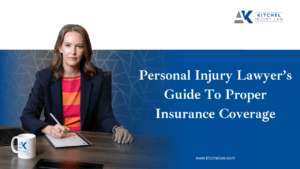
1. Have you recently taken a case to trial, and what is your experience with cases similar to mine?
Most cases settle. I’d say 90% of cases settle. But of those, I’d estimate only half settle for full value without filing suit. Insurance companies know who is scared to file suit and who does it without flinching. They know who gets top verdicts and who doesn’t. They know who spends money and hires great experts and who cuts corners and cheapens out. An attorney with recent experience trying a case like yours is a good bet. Your case will probably settle, but it won’t settle for top dollar if the insurance carrier doesn’t believe your lawyer will take them to trial.

2. Do you teach continuing legal education programs?
Lawyers who teach their peers are often highly regarded in the legal community, signifying their expertise. Choosing a lawyer committed to sharing knowledge can signal a strong command of the law and dedication to their practice. It also shows that their peers look to them as leaders in the field.
3. What part do you enjoy most about your job?
This question goes beyond simply enjoying the job. It seeks to understand the driving force behind a lawyer’s approach. A passionate and dedicated attorney will provide an answer that gives you a gut feeling that they are in this business for the right reasons. Understanding a lawyer’s motivations reveals their core values. An attorney who derives fulfillment from helping clients navigate difficult situations is likely to be a compassionate and dedicated advocate.

4. Have you visited a client’s home?
This is a trick question. The answer should be “Yes, I have been to many clients’ homes.” The wrong answer is “I meet with clients in my office.” A personal injury lawyer who takes the time to visit their clients’ homes demonstrates a deep level of commitment and empathy. It also shows respect for a client by honoring the fact that they are hurt and vulnerable. The fact is that going to a client’s home allows me to understand on a granular level how an injury has impacted their daily life.

5. Can you provide references from previous clients?
Testimonials from past clients can offer valuable insights into a lawyer’s work style, communication practices, and overall commitment to client satisfaction. These insights can be helpful in making an informed decision about your representation. Hearing directly from former clients can help establish trust and provide a better understanding of a lawyer’s approach to communication, case management, and client care.
6. How many cases are you currently handling and how will my case be staffed?
Understanding a lawyer’s workload is important for ensuring personalized attention throughout your case. Finding an attorney who prioritizes quality representation over quantity can make a significant difference in the outcome. A lawyer with the capacity to fully dedicate themselves to your case is crucial. A manageable workload translates into greater availability and personalized care. It is typical – including at Kitchel Law – for legal assistants and paralegals to help an attorney work your case. If your attorney has 100 or more cases, be wary. In our view that is too many cases for an attorney to handle diligently.
7. How often do you conduct focus groups?
Focus groups provide valuable insights into how potential jurors might view a case. A lawyer committed to this thorough form of research is likely to develop a more persuasive and effective trial strategy. Understanding how a jury might perceive evidence and arguments is crucial in personal injury cases. A lawyer who regularly conducts focus groups demonstrates a dedication to anticipating jury reactions and tailoring their approach accordingly. A lawyer who values this tool is likely to be well-prepared and attuned to the nuances of jury decision-making.
8. Do you have malpractice insurance?
This type of insurance offers protection in the instance of an error in handling your case. Malpractice insurance is not always required. Choosing an attorney who has this safeguard in place demonstrates their commitment to responsible representation. While unlikely to be needed, malpractice insurance demonstrates a lawyer’s commitment to accountability and responsible practice. It offers an additional layer of protection for clients.
9. What do the reviews really say?
Reviews that include specific details and reflect a personalized experience are often the most reliable indicators of a lawyer’s commitment and genuine care for their clients. Pay attention to the specifics within reviews rather than simply the star rating. Look for clues about how clients felt during their representation, not just what the client thought of the outcome. Do the reviews convey genuine experiences and a lawyer’s dedication to their clients? Look for reviews that offer detailed explanations and insights into a lawyer’s work style and compassion. These elements are often better indicators of quality than a simple star rating.
10. What does the contract say and how is it presented?
When meeting with a potential personal injury lawyer, pay close attention to the length and complexity of their contract. A reputable attorney should provide a straightforward, concise contract that clearly outlines the terms of your agreement. Be wary of lengthy, convoluted contracts that seem designed to confuse or mislead you. Red flags: – does the contract spell out a process for what happens if you decide to fire the lawyer and find a new one? This might suggest this lawyer has been fired and they are worried about being fired again. Do they ask you for money upfront? Do they want you to sign a contract before you talk to a lawyer?
FREE CONSULTATION
While it is important to consider these questions, trust your gut when selecting a personal injury attorney in Arlington, Va, or Washington, D.C. Look for a lawyer who shows empathy, boosts your confidence, and gives you the sense that you don’t need to worry. At Kitchel Law, we want you to be able to focus on your health without worrying about insurance and medical bills
There are lots of good personal injury attorneys to choose from, but some firms are more focused on maximizing profit and so overload lawyers with too many cases. By questioning and researching prospective attorneys, you can effectively locate the perfect personal injury lawyer for your case in Arlington, Fairfax, or Washington, D.C.
Schedule a FREE CONSULTATION with us through the contact form below. Do not worry about any upfront fees because here at Kitchel Law, we work on a contingency fee or a “no win, no fee” basis.





